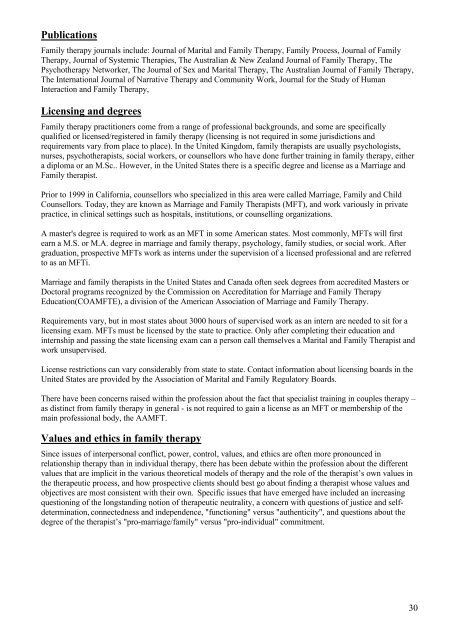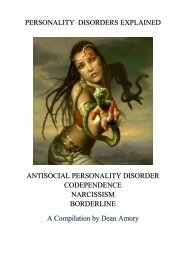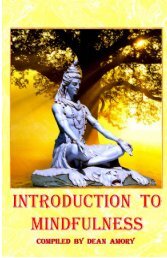FAMILY THERAPY - DEAN AMORY
This is the new, extended and improved version of “An Introduction to Family Therapy”, your reference guide containing detailed information about all important facets of family therapy: schools and methods, strategies used, structure and content of family therapy sessions, stages, basic techniques, influential people, history of family therapy,… Since I feel many people will benefit and appreciate being allowed easy access to this kind of information ordered in short, easily accessible chapters, I decided to make this compilation work - based on information freely available in the public domain -, available for free to everybody as a download file. ----//---- The cover illustration is from Zirta from Mexico: www.zirta.net - email address: beatriz@zirta.net
This is the new, extended and improved version of “An Introduction to Family Therapy”, your reference guide containing detailed information about all important facets of family therapy: schools and methods, strategies used, structure and content of family therapy sessions, stages, basic techniques, influential people, history of family therapy,… Since I feel many people will benefit and appreciate being allowed easy access to this kind of information ordered in short, easily accessible chapters, I decided to make this compilation work - based on information freely available in the public domain -, available for free to everybody as a download file.
----//----
The cover illustration is from Zirta from Mexico: www.zirta.net - email address: beatriz@zirta.net
You also want an ePaper? Increase the reach of your titles
YUMPU automatically turns print PDFs into web optimized ePapers that Google loves.
Publications<br />
Family therapy journals include: Journal of Marital and Family Therapy, Family Process, Journal of Family<br />
Therapy, Journal of Systemic Therapies, The Australian & New Zealand Journal of Family Therapy, The<br />
Psychotherapy Networker, The Journal of Sex and Marital Therapy, The Australian Journal of Family Therapy,<br />
The International Journal of Narrative Therapy and Community Work, Journal for the Study of Human<br />
Interaction and Family Therapy,<br />
Licensing and degrees<br />
Family therapy practitioners come from a range of professional backgrounds, and some are specifically<br />
qualified or licensed/registered in family therapy (licensing is not required in some jurisdictions and<br />
requirements vary from place to place). In the United Kingdom, family therapists are usually psychologists,<br />
nurses, psychotherapists, social workers, or counsellors who have done further training in family therapy, either<br />
a diploma or an M.Sc.. However, in the United States there is a specific degree and license as a Marriage and<br />
Family therapist.<br />
Prior to 1999 in California, counsellors who specialized in this area were called Marriage, Family and Child<br />
Counsellors. Today, they are known as Marriage and Family Therapists (MFT), and work variously in private<br />
practice, in clinical settings such as hospitals, institutions, or counselling organizations.<br />
A master's degree is required to work as an MFT in some American states. Most commonly, MFTs will first<br />
earn a M.S. or M.A. degree in marriage and family therapy, psychology, family studies, or social work. After<br />
graduation, prospective MFTs work as interns under the supervision of a licensed professional and are referred<br />
to as an MFTi.<br />
Marriage and family therapists in the United States and Canada often seek degrees from accredited Masters or<br />
Doctoral programs recognized by the Commission on Accreditation for Marriage and Family Therapy<br />
Education(COAMFTE), a division of the American Association of Marriage and Family Therapy.<br />
Requirements vary, but in most states about 3000 hours of supervised work as an intern are needed to sit for a<br />
licensing exam. MFTs must be licensed by the state to practice. Only after completing their education and<br />
internship and passing the state licensing exam can a person call themselves a Marital and Family Therapist and<br />
work unsupervised.<br />
License restrictions can vary considerably from state to state. Contact information about licensing boards in the<br />
United States are provided by the Association of Marital and Family Regulatory Boards.<br />
There have been concerns raised within the profession about the fact that specialist training in couples therapy –<br />
as distinct from family therapy in general - is not required to gain a license as an MFT or membership of the<br />
main professional body, the AAMFT.<br />
Values and ethics in family therapy<br />
Since issues of interpersonal conflict, power, control, values, and ethics are often more pronounced in<br />
relationship therapy than in individual therapy, there has been debate within the profession about the different<br />
values that are implicit in the various theoretical models of therapy and the role of the therapist’s own values in<br />
the therapeutic process, and how prospective clients should best go about finding a therapist whose values and<br />
objectives are most consistent with their own. Specific issues that have emerged have included an increasing<br />
questioning of the longstanding notion of therapeutic neutrality, a concern with questions of justice and selfdetermination,<br />
connectedness and independence, "functioning" versus "authenticity", and questions about the<br />
degree of the therapist’s "pro-marriage/family" versus "pro-individual" commitment.<br />
30


















